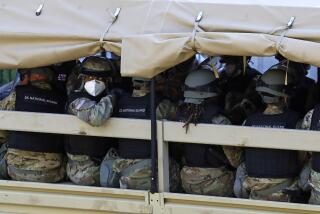Guard Likely Would Resist Domestic-Only Role
- Share via
WASHINGTON — They are the oldest component of America’s armed forces--the nation’s first citizen-militia--known for their rapid-response role in battling floods, hurricanes, earthquakes and other domestic disasters.
But over the last decade, the National Guard has increased another of its responsibilities: fighting alongside other U.S. troops overseas and participating in extended foreign peacekeeping deployments.
The expanded mission is a source of pride for many Guard members, who say they are increasingly apprehensive about efforts by policymakers and politicians to make them forgo foreign entanglements and stick to stateside assignments.
Their anxiety became more acute last week when a federal commission recommended that the Army National Guard broaden its domestic mission by reorganizing, training and equipping itself to respond to terrorist attacks on U.S. soil.
The congressionally appointed panel, led by former Sens. Warren B. Rudman (R-N.H.) and Gary Hart (D-Colo.), proposed creating a Cabinet-level “homeland security agency” to coordinate domestic counter-terrorism, warning that an attack involving nuclear, chemical or biological weapons is likely within the next 25 years.
It would be a significant change for the 350,000-strong Army Guard. National Guardsmen are unique among U.S. military forces because they have two commanders in chief, answering to state governors when asked to assist during major emergencies and to the president during times of global conflict.
Korean War a High-Water Mark
More than 138,000 guardsmen were mobilized in the Korean War, and there were smaller foreign missions during the Berlin airlift and the Vietnam War. Members of the Guard also have been called to serve during numerous strikes and riots at home. The Persian Gulf War marked a turning point. More than 63,000 Army Guardsmen were called to serve in Operation Desert Storm. The expanded deployments continued after the conflict ended; Guard units have taken part in peacekeeping missions in Somalia, Haiti, Saudi Arabia, Kuwait, Bosnia-Herzegovina and Yugoslavia. Currently, 3,200 Army and 2,955 Air Guardsmen are stationed in more than 20 countries.
“Now they are 100% set up for war-fighting,” said Marine Reservist Frank Hoffman, a member of the Commission on National Security.
Hoffman suggested that the National Guard reduce its air defense forces to 15 battalions from 23 but increase its chemical response battalions to 10 from three. He said training should put less emphasis on conventional warfare and more on biochemical attacks and other emergencies involving weapons of mass destruction.
While some military analysts see homeland defense as a better fit for the National Guard, they acknowledge it is likely to meet with considerable internal opposition.
“There will be a resistance from everyone with this proposal,” predicted Mike Vickers of the Center for Strategic and Budgetary Assessments. “The politics is the problem. Stripping them down and focusing them more, making them less warriors and more domestic disaster relief . . . is harder on the ego. It is not necessarily why people join the Guard.”
Guard members, for their part, say they already are pursuing a “homeland defense” agenda.
“Chemical, biological threats are known threats. The National Guard has already got a handle on that,” said Jon Myatt, spokesman for the Florida Department of Military Affairs, which manages the state Guard. “If they confine us to that area alone, that does not provide us with a robust enough force. I don’t believe it is prudent to eliminate other missions to take that on.”
Homeland Defense Still Comes First
Myatt cited the Guard’s weapons of mass destruction civil support teams established after the 1995 federal building bombing in Oklahoma City to help civil authorities respond to terrorist attacks on U.S. soil. California has two such teams, one stationed in Los Alamitos and one in the Bay Area. Nationwide, 10 teams are awaiting certification, 12 more are in training and Congress has authorized the creation of five more.
“Homeland defense is a mission that historically we have been tied to. We want to support our nation in times of war, but we want to take care of our homeland first,” said Maj. Stan Zezotarski, deputy director of public affairs for the California National Guard.
Maj. Ron Elliott of the 49th Armored Division of the Texas National Guard said the organization has always prided itself on being “dual-mission capable.”
Elliott recently returned from Bosnia-Herzegovina, where guardsmen were given headquarters command over active troops. It was the first time since the Korean War that a Guard unit was assigned that responsibility.
“From the Guard perspective, we were happy to do that,” Elliott said. If the service is limited to stateside deployments, “I think it would lose the appeal and effectiveness that a lot of people join the Guard for.”
Hoffman said he doesn’t expect to see an immediate response to the panel’s recommendations.
“We think we are actually just lighting a fuse,” he said. “This won’t be implemented in 90 days or two years. This is a direction to move toward.”
The Bush administration has not taken a specific position. Defense Secretary Donald H. Rumsfeld is overseeing a “top-to-bottom” review of the nation’s defense needs but has not commented about the commission’s plan for restructuring the Guard.
More to Read
Sign up for Essential California
The most important California stories and recommendations in your inbox every morning.
You may occasionally receive promotional content from the Los Angeles Times.













